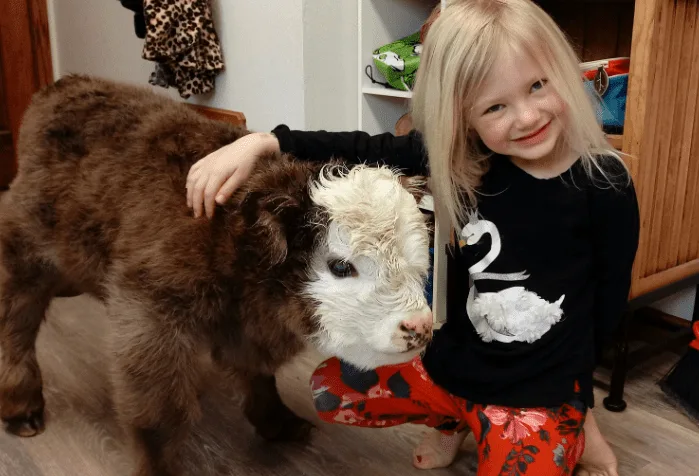Introduction
Are you dreaming of starting a mini farm or looking for the perfect small cow breed to add to your backyard? Small cows are growing in popularity because they offer all the benefits of larger cows but are more manageable for hobby farmers and small-scale ranchers. In this article, we’ll explore the top five small cow breeds that are ideal for limited spaces, giving you a detailed look at their unique characteristics, care requirements, and what makes them the best choice for small-scale farming.What Are Small Cows and Why Are They Popular?
Small cows, often referred to as miniature cattle, are breeds that have been specifically bred to maintain a smaller stature compared to standard cattle. They usually weigh between 500 and 800 pounds, making them perfect for those who don’t have the space or resources to manage larger livestock. Their popularity is on the rise, thanks to their lower feed requirements, friendly temperament, and versatility in different farming environments.1. Miniature Hereford
Miniature Herefords are known for their gentle nature and hardy constitution. Weighing between 500 and 700 pounds, these cows have the same look and feel as the larger Hereford breed but are more suitable for smaller farms. Their calm demeanor makes them a popular choice for families with children, while their easy care requirements make them an excellent option for first-time cow owners. Miniature Herefords have a lifespan of around 15-20 years, provided they receive proper care and a healthy diet.2. Dexter Cattle
Dexter cattle are among the smallest of the traditional breeds, with mature cows weighing between 600 and 800 pounds. They are versatile, serving as both milk and meat producers. Dexter cows are known for their high-quality milk, which has a rich cream content, as well as their flavorful beef. This breed is a favorite among homesteaders who value a dual-purpose cow that can fit into smaller pastures. With proper care, Dexter cattle can live for 20-25 years, making them one of the more long-lived small cow breeds.3. Miniature Jersey
Miniature Jerseys are perfect for those who want a dairy cow that doesn’t take up much space. Known for their high butterfat milk, these cows weigh about 400-600 pounds. They’re easy to handle and have a friendly nature, making them great for small family farms. Plus, their small size allows them to be kept in smaller barns or sheds, which makes them highly adaptable to various environments. The lifespan of a Miniature Jersey is typically around 18-22 years with appropriate care.4. Lowline Angus
Lowline Angus cattle are a smaller version of the traditional Angus breed. Weighing around 500-700 pounds, they are known for producing high-quality beef in a compact package. Their smaller size makes them easier to manage, while still providing excellent marbling in the meat. They are also adaptable to various climates, making them suitable for different regions. Lowline Angus cows usually live for 15-20 years when given proper nutrition and veterinary care.5. Scottish Highland Miniature
The miniature version of the iconic Scottish Highland cow, these small cows maintain the breed’s signature long hair and horns. Weighing between 400 and 700 pounds, their hardy nature makes them great for colder climates, while their friendly demeanor makes them popular as pets or for hobby farms. Their long coat helps them thrive in rough weather conditions, and they are relatively low maintenance compared to other breeds. Typically the lifespan of a mini highland cow is about 18-22 years, thanks to their robust health and adaptability.What to Consider Before Buying a Small Cow
Before investing in a small cow, it’s essential to understand the space, feeding, and healthcare needs. Though small cows require less space than larger breeds, they still need adequate room to graze and move around. They also require appropriate nutrition, including quality hay, minerals, and sometimes supplemental feed. Regular veterinary care, vaccinations, and parasite control are essential for keeping your small cows healthy.Tips for Raising Small Cows
Proper care of small cows involves setting up a suitable living space, providing shelter, and following a consistent feeding schedule. Small cows may be smaller in size, but they still need a proper diet to stay healthy and productive. Knowing their nutritional requirements and keeping their living environment clean is crucial for maintaining their well-being.Are Small Cows Right for You?
Choosing to raise small cows should align with your farming goals and lifestyle. Whether you’re interested in dairy production, meat, or simply having them as pets, understanding the time, effort, and costs involved will help you make the right choice.Conclusion
Small cows offer a charming, manageable option for hobby farmers, homesteaders, and small-scale ranchers. With a variety of breeds to choose from, each offering its own set of benefits, it’s easy to find a cow that fits your needs. Miniature Herefords, Dexter cattle, Miniature Jerseys, Lowline Angus, and Scottish Highland Miniatures are some of the top options worth considering for their unique characteristics and adaptability to smaller farming setups.FAQs
- Can small cows live in a backyard? Yes, small cows can live in a backyard, provided there is enough space for grazing and shelter.
- How much milk can you expect from a Miniature Jersey? A Miniature Jersey can produce around 1-3 gallons of milk per day, depending on diet and milking frequency.
- Are small cows more expensive than larger breeds? While the initial cost may be higher, the long-term expenses for feeding and housing are generally lower.
- Do small cows need special veterinary care? They require standard veterinary care similar to larger cows, including vaccinations and parasite control.
- What is the average lifespan of a small cow? The lifespan varies by breed but generally ranges between 15 and 25 years, depending on care and living conditions.

